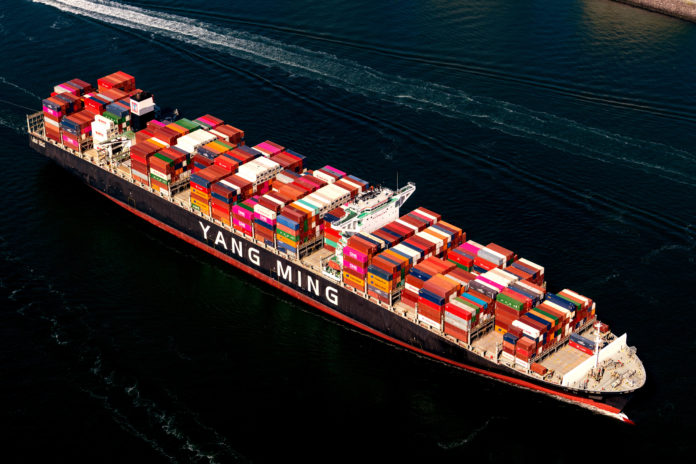The taiwan-based carrier, Yang Ming (YM), has formulated several long term strategies that it says will meet the environmental targets set by the International Maritime Organization (IMO).
As shipping companies are committed to meet the IMO eco-goals, cutting global shipping carbon intensity by at least 40% by 2030 and 70% by 2050 when compared to 2008, Yang Ming has decided to implement 12 vessel modification and optimisation projects and accelerate its vessel renewal plan by eliminating ships over 20 years of age, adding ten 2,800TEU class, 20 14,000TEU and 14 11,000TEU class eco-friendly smart vessels.
A Yang Ming spokeswoman told Container News that not all the vessels that underwent modifications are YM self-owned. “For instance, five of our charter-in vessels were modified and adopted the energy-saving bulbous bow designs,” she said.
In the meantime, Yang Ming has co-operated with weather service provider Weathernews Inc. (WNI) to build a monitoring system to manage fuel consumption and reduce GHG emissions, and the company will further evaluate the possibility of developing dual-fuel engines such as LNG or other vessel power systems that are carbon-neutral.
As for sulphur oxide emissions, the Taiwanese firm said, it “ensured an early transition to use low sulphur fuel oil at Kaohsiung and Shenzhen Ports in 2018.” In the fourth quarter of 2019, Yang Ming’s fleet had switched to very-low sulphur fuel oil (VLSFO) with sulphur content lower than 0.5% and reduced sulphur oxide emissions by 80% compared to traditional heavy fuel oil.
Container News asked Yang Ming whether these changes were forced on the company by new regulations, Yang Ming responded, “Many of our vessels were built many years ago and designed to give a greater amount of energy and speed. However, the industry has focused on slow steaming in recent years, we made modifications and retrofits on those ships to fit our low-speed requirements, and at the same time added new eco-friendly ships to our fleet to optimise the overall eco-friendly performance.”
The member of THE Alliance is currently using diesel engines with electronic injection control to reduce emissions.
Yang Ming has also de-rated 22 vessels’ main engines, according to its spokesperson, which were originally to maximum speed in normal design. Because of the slow steaming, the vessels are operated at a non-optimised engine load level, which meant these older engine designs were no longer optimal, due to the higher fuel consumption, admitted YM.
Since slow streaming has become common practice in the industry, the Taiwanese carrier de-rated these vessels’ engines to be able to operate at lower speeds, substantially reducing emissions and fuel consumption from each vessel. “The derating measure has further reduced fuel consumption and carbon emissions,” the company added.
Furthermore, Yang Ming has actively participated in vessel speed reduction programmes initiated by the National Oceanic and Atmospheric Administration (NOAA) and Taiwan International Ports Corporation, LTD to protect the marine environment.
Editor
Antonis Karamalegkos







